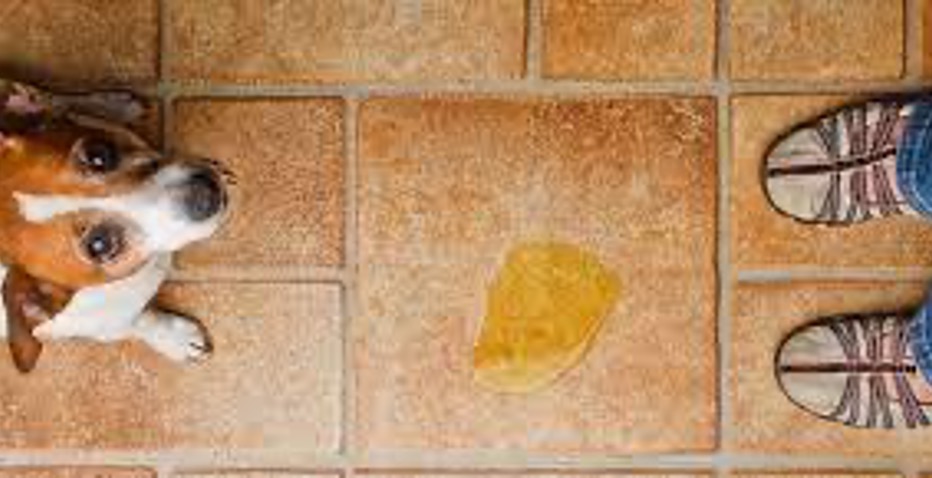There is usually one behavior that, universally, pet owners work really hard to train and that is for the dog to go to the bathroom outside. Everyone breaths a collective sigh of relief when the new dog in the house start either alerting that they need to go outside or is able to wait until we let them our prior to relieving them selves in the house. So when that behavior is no longer reliable I usually see dogs pretty quickly to find out why this is happening. This behavior can be really easily solved or it can be pretty complicated.
We will generally start with taking a history to see how long this behavior has been going on, if there seems to be any pattern to the behavior, if your pet is straining to urinate, if there is blood in the urine and if there has been any recent changes in the house. All of this information helps up put together a timeline of events and help us determine what kind of initial testing would be helpful. I will share some recent cases with you so you can see some key differences in causes for this behavior.

Case 1: My dog keeps peeing on my bed
I was presented with a 9 year old lab mix named Daisy. Her owner reported that over the past few weeks she kept finding urine in her bed. Daisy sleeps with her but this has never happened before. During the day Daisy acted completely normal. Going outside the same number of times and urinating normally on walks. Nothing new has been going on in the house.
Daisy’s physical exam was normal and her owner typically does annual lab work monitoring on her so her last set of lab work from three months prior was normal. We decided to check a urine sample to make sure there was no evidence of inflammation or infection but it was suspected that Daisy had developed urinary incontinence. Daisy’s urine sample was normal so we started her on a medication to improve urethral sphincter tone and prevent leaking. Daisy has responded really well and has not had any accidents.
Case 2: My dog is squatting to pee a lot but only a little bit comes out, she seems really uncomfortable.
Lola a 2 year old Akita presented for a three day history of squatting to urinate 5-6 times during walks which is really unlike her. She may be drinking a little more water and she had one urinary accident in the house while her owner was at work.
Lola’s physical revealed a swollen vulva, we suspect that Lola had been licking herself a lot, and a mild fever. Since Lola was a young dog and this has been going on a short period of time we suspected a lower urinary tract infection. Her urine sample had a small amount of blood, white blood cells, and rod shaped bacteria. We asked the lab to preform a culture and sensitivity on the urine sample so we would know exactly what kind of bacteria she had and what antibiotics would be best to treat her with. That test showed that it was E. Coli bacteria and could be treated with an antibiotic called amoxicillin. After a few days on antibiotics Lola started feeling much better and her follow up urine sample showed no evidence of bacteria.
Case 3: Help! My dog is peeing blood in the house!
Scabber’s is an 11 year old wheaten terrier mix. He had had one previous episode of this behavior ~6m prior to presentation and it resolved with antibiotics. He was acting pretty normally at home except that every time he urinated it was mostly blood.
On Scabber’s physical exam he had a small amount of what looked like blood at the end of his penis, no fever, and he was a bit uncomfortable when his abdomen was palpated. We did a rectal exam and it was also noted that Scabber’s prostate was enlarged- although he did not seem painful. We decided to submit blood and urine testing on Scanner’s since he was an older dog and this was a recurring problem. His blood work looked great and the only abnormality on his urine sample was the large amount of red blood cells. Next we took x-rays to see if we could find bladder or kidney stones that could be causing the blood- no luck the x-rays were normal. We started anti-inflammatory medication and referred Scanner’s to a veterinary internal medicine specialist for an abdominal ultrasound. On the ultrasound it was found that Scabber’s had developed cancer on his prostate. His owner did not wish to pursue surgery or chemotherapy given the overall poor prognosis. Scabber’s is currently being treated with an anti-inflammatory, antibiotic, and stool softeners. This diagnosis was made approximately eight months ago and Scabber’s is doing pretty well.
Case 4: My dog is peeing in the house, this seems to happen every few months.
Cassie is a 5 year old Shih Tzu who has presented multiple times over the past year for peeing in the house. Her urine sample always had bacteria in it and her cultures were E. Coli bacteria. Cassie did always respond to antibiotics but everyone was starting to worry about why she kept getting infections.
Cassie’s physical exam was normal except that she has an excessive amount of tissue around her vulva. You could not even see it unless you lifted up this extra tissue. We decided to take x-rays to look for stones. We did find them! Her tiny bladder was full of small to medium sized stones. We had two options at this point. Take Cassie to surgery to remove the stones or try to dissolve them with prescription food. Since Cassie was overall feeling pretty good we decided to try to dissolve them. We put Cassie on a strict diet with prescription food and we saw her back one month later to re-check x-rays. There were no more stones, everyone was very happy. Unfortunately about three weeks later Cassie was back at the office with another urinary tract infection. X-rays still showed no stones, which was great because she was still eating the prescription diet. But we elected to do surgery to remove the excessive tissue around her vulva. That was about a year ago and Cassie has not had another urinary tract infection. We still do x-rays once a year to look for stones but Cassie will have to eat the prescription food long term to hopefully prevent the formation of new stones in the future.
This is only a few causes of the same sign, peeing in the house. We have not even touched on Diabetes, Hyperadrenocorticism, Inflammatory, or Infectious diseases that could cause this. So the moral of the story is if your pet has an abrupt change in behavior it is best to have it evaluated. Hopefully the answer is simple but it may require some testing or even repeating the same test to get an answer.


